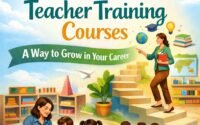25 Frequently Asked Questions Indian Teachers Ask Before Beginning Online Montessori Teacher Training
1. What is an online Montessori teacher training course and how does it work?
An online Montessori teacher training course is a program applying digital learning to teach the Montessori educational method. Usually it include texts, homework, and video lectures on Montessori’s philosophy and teaching strategies. Mostly with the help of an e-learning platform, you study from home using a computer and an internet connection. The course could be self-paced or have live online lectures. Though it provides freedom, it reproduces the content of classroom instruction so that Indian teachers may pick Montessori methods anywhere.
2. Is Montessori teacher training available online in India?
Indeed, India offers many of online Montessori teacher training programs. Many teacher preparation colleges provide online Montessori certification courses for Indian educators. These courses are developed to fit local needs even if Montessori standards are maintained internationally. From any Indian city, you can register for an online Montessori teacher training course and complete the tasks remotely. By making Montessori education instruction practical for working instructors and those unable to physically attend classes, this extends access to it all throughout India.
3. What are the eligibility criteria for Montessori teacher training in India?
Usually, you have to have completed at least your 10+2 (upstream secondary) education before qualifying for Montessori instruction in India. Stated differently, the minimum needed is a high school degree or equivalent. Although many universities let candidates with a 12th pass in, some favour graduates. Generally speaking, you should be at least eighteen. Usually there is no maximum age limit; as long as they meet the fundamental education requirements, both experienced teachers and recent school dropouts are welcome to enrol.
4. Do I need a teaching background or experience to enroll in a Montessori course?
No, you can sign up for a Montessori teacher preparation program without any prior teaching experience. Enrolment in these programmes is open to both experienced instructors and those just starting out. Since the training starts with basic ideas, beginners can follow along with great ease. The training will cover all aspect, including Montessori philosophy and classroom strategies. Though it is not needed, having an educational background can help. From the bottom up, any Indian teacher—regardless of experience level—can enrol and pick up the Montessori approach.
5. What is the typical duration of an online Montessori teacher training course in India?
Online Montessori teacher training programs in India can run one to many years. Usually finishing a comprehensive diploma course takes six months to a year. While postgraduate diplomas or advanced degrees could last up to 12 or 15 months, certain Montessori certificate courses might run about 3 to 6 months. Whether you study part-time or full-time often determines the duration. Online courses usually offer flexibility; for instance, you might have eight months to finish a course that could be finished more quickly if you put in more hours each week.
6. How much does a Montessori teacher training course cost in India?
The institution and course level determine how much Montessori teacher preparation costs in India. While more comprehensive diplomas can cost ₹50,000 or more, basic online certificate courses can run approximately ₹20,000. Some long courses, especially those with international accreditation, could run several lakh rupees in cost. Online Montessori teacher training courses are sometimes less expensive in India than conventional classroom environments. Thanks to the many institutes’ installment payment schemes, teachers on a restricted budget will find the tuition reasonable.
7. Is an online Montessori certification recognized in India?
Indeed, in India an online Montessori certification is approved as long as it comes from a reputable company. Whether acquired in-person or online, teachers with a current Montessori teacher certification are welcome to work in Montessori preschoolers and schools in India. Correct accreditation of the program is quite vital. Courses approved by respectable companies like the American Montessori Society (AMS) or the Association Montessori Internationale (AMI) raise credibility and international acceptability. Make sure the online course provides an accepted diploma or certificate acceptable for use in Indian institutions always.
8. What certificate or diploma will I receive after completing Montessori training?
Usually upon completion of the Montessori course, you will be given a certificate or certification in Montessori Teacher course. It can be called a “Montessori Teacher Training Diploma,” “Montessori Education Certificate,” or something else entirely. This certification guarantees that, typically early childhood, three to six years old, you have undergone instruction in Montessori techniques for a designated age range. Usually, the validity of the certificate will rise if an international Montessori organisation or an Indian teacher training body accepted your course.
9. What will I learn in a Montessori teacher training course?
Montessori teacher training courses for Indian teachers address both the Montessori approach’s theory and application. Apart from learning child development theories, you will also acquire understanding of the Montessori philosophy and the life of Dr. Maria Montessori. A comprehensive curriculum addresses practical skills include presenting Montessori materials in disciplines including language, math, cultural studies, and sensory exercises. You will also get up skills in Montessori classroom organisation, mixed-age group leadership, and child independence and creativity encouragement.
10. Are there different levels or types of Montessori training courses in India?
Indeed, Indian instructors might find several Montessori certification courses with different criteria accessible to them. Certain schools provide a quick certificate program or an introduction course covering Montessori principles. The more popular option is the comprehensive, usually six to twelve month Diploma in Montessori Teacher Training. There are additional advanced or postgraduate diploma courses available for in-depth research as well as specialist programmes catered to certain age groups (like 0–3 years, 3–6 years, or 6–12 year). Your professional goals will help you choose either a basic certification or a thorough diploma program.
11. Can I pursue Montessori teacher training while working?
One could definitely finish a Montessori training program and also be working. Online Montessori courses are designed to be adaptable for those working professionals. You can study whenever it would be most convenient for you since many courses are self-paced or offer live classes on the weekends or nights. Many times, Indian instructors keep up their day occupations while finishing their Montessori certification. Although commitment and good time management are crucial, the online structure helps one to balance job with education. Many companies also support instructors to take Montessori training since it improves their teaching profile.
12. Do I need any special materials or equipment for an online Montessori course?
An online Montessori course mostly requires a computer (or tablet) and a consistent internet connection. Online access to course readings and videos is provided. You usually not have to buy Montessori materials to complete the course, even although having some basic supplies or making do-it-yourself versions for practice can be helpful. Certain courses could call for you to improvise with common objects or acquire kits. Additionally helpful are a notebook for noting ideas and maybe a quiet space for instruction.
13. Is there a practical teaching component in online Montessori training?
Indeed, most excellent online Montessori training courses include some sort of practical element. Montessori education stresses hands-on learning, hence even online courses seek for opportunities to acquire useful skills. You can be expected to spend a particular set amount of hours observing classrooms or completing teaching assignments. You can set this up in your city; some programs call for you to serve as a trainee intern at a nearby Montessori house or preschool. Some would want you to forward movies of yourself guiding a small group or a child through Montessori activities.
14. How are exams or assessments conducted in online Montessori courses?
Online Montessori courses usually evaluate their students using a mix of tests and remote tasks. Regularly you may be given multiple-choice tests or quizzes based on following online modules. Common projects are material production, child development articles, or Montessori lesson plans. Should a final exam arise, a project submission or an online examination could be needed. Practical assessments include sending films of you delivering a Montessori lesson or having an assessor observe you during an internship.
15. What are the career opportunities after completing Montessori teacher training in India?
Getting a Montessori credential lets one explore several early childhood education paths. As Montessori schools open more throughout India, demand for teachers with Montessori background is rising. You can work as a teacher in Montessori kindergartes and preschoolers in India. Many Montessori-trained teachers also work in overseas schools with Montessori sections. With experience, you could progress to become a head teacher or central coordinator. Using their knowledge, some teachers open their own Montessori nursery or preschool.
16. How is Montessori teacher training different from other early childhood education programs?
Montessori teacher preparation centres especially on the educational theory and practices developed by Dr. Maria Montessori. Its focus on mixed-age classrooms, self-directed learning, specific Montessori materials, distinguishes it from general early childhood education (ECE) or nursery teacher training (NTT). In a Montessori course, you learn how to be a guide rather than a conventional teacher, therefore fostering children’s independence and letting them grow by experience. Montessori training bases on a more established approach.
17. Are Montessori teacher training courses offered in Hindi or other Indian languages?
The most of online Montessori teacher training courses in India are accessible in English since many Montessori tools and vocabulary are in English. If they aid local student groups, some universities may provide help or explanation in Hindi or another regional tongue, nevertheless. Though less common, certain training centres might include courses in a native vernacular. If you’re not confident speaking English, look for initiatives offering multilingual materials or have mentors who can clarify ideas in your language.
18. Is there an age limit for enrolling in Montessori teacher training?
Given that you have finished your 10+2 schooling, the usual minimum age to enrol is about 18. Any adult can engage in Montessori training; no upper age limit exists. Enrolled in Montessori teacher training courses in India are college students, young professionals, even retirees. Anyone strongly interested in early childhood education is welcome in this sector. Any age qualifies you to be a Montessori teacher as long as you can engage with young kids in a classroom and with the coursework.
19. Can Montessori training be applied in regular preschools or only Montessori schools?
Not only in formal Montessori schools but also in any preschool or early childhood environment. Montessori training can be quite helpful. In traditional preschools, the ideas you learn—such as using hands-on materials, creating a prepared environment, and respecting a child’s pace—can also help to enhance teaching. Many Indian preschoolers combine parts of the Montessori ideas even if they are not exactly Montessori institutions. Any classroom can include Montessori-style activities and child-centered learning techniques applied with your training.
20. How can I choose the best Montessori teacher training course in India?
While choosing the best Montessori training course, take some careful consideration of several key factors. Start with the program’s accreditation. Ideally, it should be approved for quality control by reputable Montessori groups like AMI or AMS. Check if the curriculum addresses all of the basic Montessori subjects—philosophy, materials, child development, etc.? Research the teacher experience and read evaluations or testimonies from past students. Consider pragmatic elements including course length, timetable adaptability, and cost as well.
21. Do I need a B.Ed degree to become a Montessori teacher in India?
Especially in the preschool level, a Bachelor of Education (B.Ed.) degree is not required to be a Montessori teacher. Montessori teacher preparation is seen as a specialised credential for teaching in Montessori and other early childhood environments. Teaching older kids in formal schools (Class 1 and up) or working in government schools typically calls for a B.Ed. in India. Usually enough for private preschoolers and Montessori classrooms is a Montessori diploma.
22. How will Montessori teacher training benefit me as a teacher?
Montessori teacher training will help you greatly advance both your teaching skills and professional growth. Understanding the learning styles of young children will help you in whatever kind of teaching environment. The Montessori approach trains you to be more sensitive and patient by guiding children rather than only teaching them. Teachers often find that their classroom management skills improve and that they inspire students’ independence and inquiry more naturally. A Montessori certification will also help you stand out in the employment scene.
23. Can Montessori teacher training help me start my own preschool?
Many do, in fact, start their own creche or preschool from their Montessori experience. From the program, you will get a firm basis in early childhood education theory, curriculum design, and classroom management. Knowing the Montessori approach will enable you to run a top-notch preschool by guiding your use of instructional resources and design of a stimulating, friendly surroundings for the children. If you have your Montessori certification and follow some preparation, you can open and run your own Montessori school or learning centre with assurance.
24. Are online Montessori courses self-paced or on a fixed schedule?
This will be decided by the body offering the course. Many online Montessori teacher training courses are self-paced, thus you can go through the modules at your own speed within a given time restriction. For Indian teachers that need adaptability, this is great. Other courses might have a predetermined calendar with live online classes at specific times (such weekends or evenings), so offering greater structure and engagement. Certain programs even mix the two approaches.
25. How do I enroll in an online Montessori teacher training course?
Usually enrolling in an online Montessori course is easy. First, do some research to identify a respected training program fit for your requirements. Usually after choosing one, you have to finish an application and send the necessary documentation, including your degrees. Then you will have to pay the course cost. Some institutions could have a brief counselling session or interview before verifying admittance. Once registered, you will be able to access the course contents or online learning platform.



